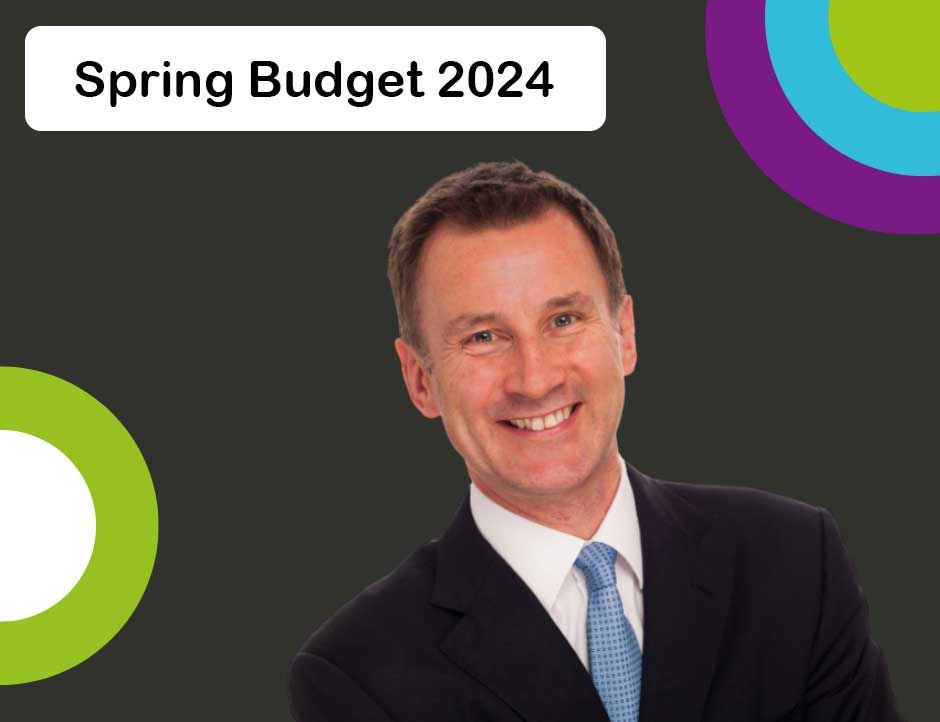Spring Budget 2024
This week Chancellor Jeremy Hunt delivered his Spring Budget. With a General Election on the horizon, many questioned how the Chancellor would balance sensible fiscal decisions with voter-pleasing political plays.
Talk beforehand largely centred on further national insurance cuts and also reductions in inheritance tax. There was also talk that should any big tax cuts materialise, that they would be funded through additional windfall taxes on energy companies.
So, let’s go through the main announcements and see if the rumours came true…
Taxation
- National Insurance, a payroll tax, cut by 2p in the pound for employees and the self-employed.
- Non-dom tax regime, for UK residents whose permanent home is overseas, to be replaced with new rules from April 2025.
- £5,000 UK ISA tax allowance for savers investing in “UK-focused” shares – to be set up following a consultation.
Business and investment
- Threshold at which small businesses must register to pay VAT raised from £85,000 to £90,000 from April.
- Covid-era government loan scheme for small businesses extended until March 2026.
- Tax reliefs for touring and orchestral productions, which had to been due to end in March 2025, made permanent.
Cigarettes, vapes and alcohol
- Freeze on alcohol duty, which had been due to end in August, to continue until February 2025.
- New tax on vaping products from October 2026, linked to the levels of nicotine.
- Tobacco duty to go up £2.00 per 100 cigarettes at same time, to ensure vaping remains cheaper.
Transport and energy
- Fuel duty frozen again, with the 5p cut in fuel duty on petrol and diesel, due to end later this month, kept for another year.
- “Windfall” tax on the profits of energy firms, which had been scheduled to end in March 2028, extended until 2029.
- Air passenger duty, the tax paid on flights, to go up for business class tickets.
- £160m deal for UK government to purchase site of planned Wylfa nuclear site in north Wales.
- A further £120m for a government fund that invests in green energy projects.
Housing
- Higher rate of tax paid on profits from selling property cut from 28% to 24%.
- Tax breaks for owners of holiday let properties scrapped.
- Stamp duty tax break when purchasing multiple properties (known as Multiple Dwellings Relief) in England or Northern Ireland to end in June.
Benefits and Income Support
- Full child benefits to be paid to households where highest-earning parent earns up to £60,000 – the current limit is £50,000.
- Partial child benefit to be paid where highest earner earns up to £80,000.
- Longer repayment period for people on benefits taking out emergency budgeting loans from the government.
- Government fund for people struggling with cost of living pressures to continue for another six months.
- £90 admin fee to obtain a debt relief order scrapped.
Public debt, inflation and the economy
- Office for Budget Responsibility predicts UK economy to grow by 0.8% this year and 1.9% next year.
- Growth of 2% predicted for 2026, with 1.8% in 2027 and 1.7% in 2028.
- UK’s inflation rate forecast to fall below 2% target by the end of June, falling to 1.5% next year.
- Public debt, excluding Bank of England debt, forecast to be 91.7% of GDP this year, rising to 92.8% next year.
- Overall day-to-day government spending to grow by 1% in real terms over next five years.
- NHS budget to go up £2.5bn next year; the service will also get £3.4bn up to 2030 to improve productivity.
Summary
So, the rumours turned out to be partially accurate. They were certainly on the money (pun intended) with regards to the reduction in national insurance contributions.
It has been described as a budget for middle-income families. It is estimated that the national insurance cuts will save the average worker £450 a year. Combined with the increase in child benefit limits, it’s clear to see whose votes the Conservatives are after.
For landlords, often the easy target for Chancellors, it’s a bit of a mixed bag. A reduction in capital gains tax but also an end to various tax breaks.
Overall, a positive budget, especially whilst the economy is still in recovery. But has it done enough to sway votes? Time will tell.
If you would like to know more, or about how it impacts you, please get in touch. We’d love to hear from you.





